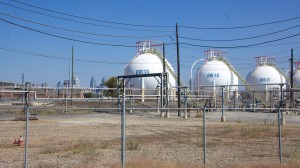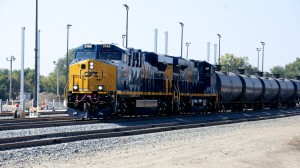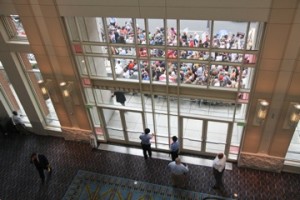Philadelphia’s mayoral race has candidates talking shale gas
-
Susan Phillips

Nat Hamilton/WHYY
Philadelphia Energy Solutions is the largest oil refining complex on the Eastern seaboard. Half of all Bakken Crude traveling across the country by rail ends up at the PES plant.
On Thursday evening business leaders and local politicians gathered at Drexel University in Philadelphia to talk about exporting Pennsylvania’s Marcellus Shale gas from the Port of Philadelphia, and got an earful from activists. But the export terminal is just one idea inside of a larger vision to turn Philadelphia into an “energy hub,” an issue that continues to come up in the city’s Democratic mayoral primary race.
So, what is an energy hub?
Here’s what the energy hub aims to do in a nut shell.
Take advantage of all that abundant Marcellus Shale gas flowing out of wells in the northeast and southwest parts of the state, places like Susquehanna County, or Washington County. Send all that gas to Philadelphia, instead of spreading it out to places like New York or Canada, or the Gulf Coast.
And once all those billions of molecules of gas get to Philly, turn them into trillions of dollars.
To do that, say the hub’s boosters, simply use cheap gas to power new factories, turn that cheap gas into plastics, or liquefy it and sell it abroad for lots of money.
And yes, create good jobs.
The energy hub’s most powerful advocate is Phil Rinaldi. Rinaldi runs Philadelphia Energy Solutions. That’s the company bringing in all that crude oil from the Bakken Shale in North Dakota across the state, inching along the city’s railroad tracks in black tank cars.
He also sits on a committee formed by the Philadelphia Chamber of Commerce called the Energy Action Team. Rinaldi and the Chamber have been pushing for an energy hub and held a closed door conference last December, where they worked to recruit new businesses to the city using cheap shale gas as the draw.
“I think you can see where we’re going, right,” Rinaldi told StateImpact back in January. “We’re going to try to build the push from the Marcellus and the pull from Philadelphia. And then the final step would be to try to create that linkage between that push and that pull.”
Rinaldi has also been showing up to Philadelphia’s mayoral forums across the city. He’s an advisor to former City Councilman and mayoral hopeful Jim Kenney.
Kenney has always been known as the guy pushing for environmental protection on Philadelphia City Council. But he also has union support, and backs the energy hub.
“It’s an interesting concept and we should pursue it,” Kenney told a crowd full of business people during a televised debate last week. When asked later about the possible push pull he may get from his green constituents versus his labor support, Kenney said that’s all part of the job.
“And that’s what I think a mayor’s responsible for doing in a city with a 28 percent poverty rate, is to find people employment that changes their lives too. And I recognize the problems associated with it and I understand the concern that folks in the environmental community have but they will be sitting at the table if we’re moving down this route.”

NAT HAMILTON/WHYY NEWS
A CSX unit train delivers a load of crude oil from the Bakken Shale in North Dakota to a refinery in South Philadelphia.
That seat at the table would come as a welcome surprise to one of the city’s most experienced environmental activists. Joe Minott has spent the last 30 years at the Clean Air Council taking companies to court in order to get them to clean up their act. Minott says his efforts to participate in the energy hub discussions have so far been met with locked doors.
“Yeah, it is frustrating,” Minott said. “It’s assuming that this group of people headed up by Rinaldi and the Chamber of Commerce sort of know what’s best for Philadelphia. And we don’t want to allow Philadelphians to participate in the discussion until we already made the decision, and then we’ll let you know what it is. That’s just obnoxious.”
Minott worries the natural gas powered plants, and processing centers would make the city’s bad air quality even worse.
“Are they talking about what the impact of a fossil fuel energy hub on air quality is in Philadelphia when we already don’t meet EPA health air standards,” asked Minott.

Todd Vachon / WHYY/Newsworks
Natural gas drilling protestors rally outside the Pennsylvania Convention Center in Philadelphia, September, 2011.
Air quality is why candidate Nelson Diaz says he’s supportive but cautious about the energy hub.
“It is important that we control the emissions in this country and not make them worse.”
Diaz is quick to point out he worked for the energy company Exelon, which generates more than half of its electricity using nuclear power, and about 22 percent through natural gas. The rest comes from hydro, wind and solar. Exelon’s PAC has donated more than $10,000 to Diaz’ campaign.
None of the six candidates for mayor have come out against the energy hub. Although business leaders like Rinaldi have been talking about this for a couple of years, it’s a new concept for the candidates and their constituencies. Most Philadelphians have been isolated from the fracking debates happening in the rest of the state. But the city has drawn large protests when the shale industry comes to town for their annual convention. And for the most part, the city’s dominant Democratic politicians have taken a critical view of the gas drilling happening upstate.
Former state lawmaker Milton Street says an energy hub just won’t happen within the next eight years and seemed annoyed when the topic came up at last week’s debate.
“Because when you start talking about these long range plans,” said Street, “that doesn’t encourage the person with immediate problems to go and vote. They can’t embrace it.”
Instead, Street proposes a solar bike path.
“You have these big solar panels along the bike path,” Street told StateImpact. “In other words if you’re going to have an energy hub with solar panels, set them up so you can ride around them. If you want to fantasize, let’s fantasize.”
Former Philadelphia District Attorney Lynn Abraham supports the energy hub as a way to bring jobs to the city.
“One of the things that will drive the new economy for Philadelphia is this new energy hub,” said Abraham at a mayoral forum on Monday.
Doug Oliver, who worked at Philadelphia Gas Works, says it’s time to capitalize on the state’s gas boom, but the hub could be more.
“We can also be talking about energy efficiency,” said Oliver. “How we create jobs for people by making homes more affordable, by weatherizing them.”
Kim Paynter / WHYY
Democratic candidates for mayor meet at the first forum Thursday morning at the Philadelphia Business and Technology Center in Parkside. From left Nelson Diaz, Jim Kenney, Milton Street, Doug Oliver, Anthony Williams and Lynn Abraham.
But perhaps the guy pushing the energy hub the most is State Senator Anthony Williams. His wife, Shari Williams, works for the industry lobbying group The Marcellus Shale Coalition. And one of the state’s largest drillers, Range Resources, donated $1,000 to the Williams campaign.
Williams says he’s got the political chops to bring the gas, and the factories, and even an export terminal, to Philadelphia.
“So I think I’m pretty good as a lobbyist if you will,” Williams told the crowd at the debate. “And certainly those relationships will not change. And by the way, they will be significant for the next mayor. That mayor has to work with City Council, state government and the federal government and I’ve done all three of those levels.”
But getting Marcellus Shale gas to Philadelphia begins with that linkage Phil Rinaldi spoke about earlier — new pipelines cutting through rural and suburban counties. Rinaldi wants to see a pipeline link running south from the lucrative gas fields in Susquehanna County, directly to Philadelphia. Nothing tangible has been proposed yet. But ongoing pipeline projects have run up against staunch opposition.

















